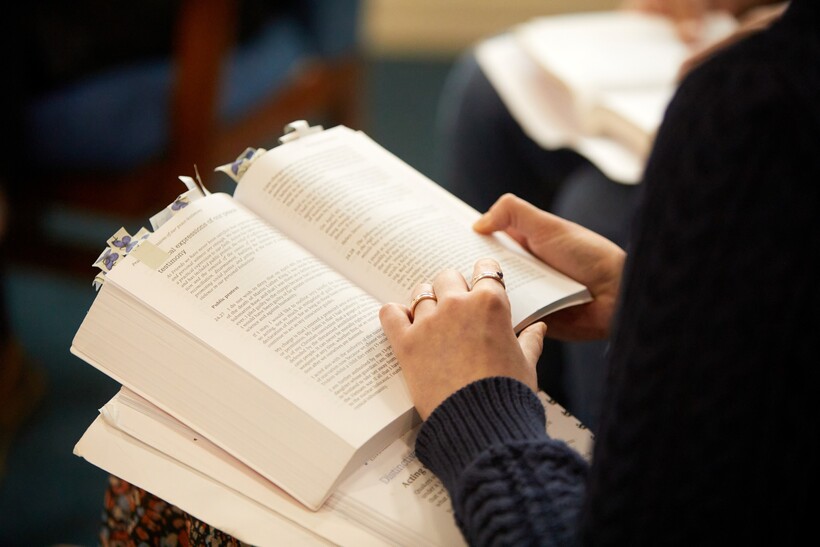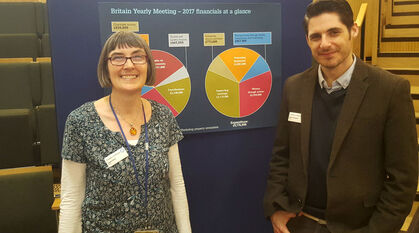5 reasons to celebrate the work of nominations committees
Zoe Prosser shares her love for the role of nominations committees in supporting Quaker work.

I fell in love with nominations when I started to work for Britain Yearly Meeting. In that role I was secretary to Central Nominations Committee, the committee that nominates Friends to coordinate Quaker work across Britain. This includes roles developing Quaker communities, supporting peace and social witness work, building connections with other faiths, as well as roles that help our faith directly, such as clerk of Yearly Meeting.
Nominations is the Quaker process we use to find Friends for different jobs. Friends come together in worship to consider who would be best to serve on a committee or take on a role. I have come to understand it as an approach that blends some of my favourite things: Quaker worship, love for each other and love for our faith.
Since moving to my role as Local Development Worker for Scotland I have been deeply impressed by the amazing creativity of local nominations committees. In both central and local work I can see the magic of nominations, working together in worship to ensure it is not a tick box exercise, pulling discernment back to our faith and the spirit again and again to create something greater than the sum of its parts.
Nominations can have a rather sad reputation within a meeting – there's even a card game about trying to avoid the nominations committee! However our nominations Friends are not isolated groups, outside of our meeting. They are part of the whole meeting community and it is the responsibility of the community to support and uphold them.
So here are my top 5 reasons why being part of a nominations committee is amazing:
1. It allows you to open yourself directly to God's guidance/That light at the centre of worship/the spirit
When nominations Friends meet to discern the right names for a role, they meet in a spirit of worship and open the meeting to divine guidance. Friends involved in nominations may find themselves led to nominate a name that may not have been high on their list when they approached the role intellectually. They can also find that none of the names are appropriate.
Within the worship Friends in the nominating group may be led to something new and exciting, challenging or unexpected. Trusting in that, and moving forward with that, is a test of faith, but it can lead to radical and brave spirit-led choices.
2. It is a direct way to serve and support your community
It is the work of the nominating committee that feeds all of the rest of the work of the meeting. The clerking team, the elders, pastoral care, often even the Friends who take care of the library, are found and nominated by the nominating committee. This is equally true on a national level, with national roles.
A nominating committee or group has the opportunity to step back and see where their community is struggling. Where are roles being turned down and why? What can meetings do to meet those concerns?
Nominating Friends also have the chance to find that Friend who was overlooked in the past and bring them further into the community by offering a role for them to undertake. They can also consider whose voices are missing and appoint Friends that truly represent the meeting. A nominations committee can build and support their community by ensuring that all Friends are included.
3. It teaches you so much about what roles are, and what is needed for them
To understand what skills and qualities are needed to fulfil a role, the nominating Friends need to understand what the role is. In understanding that role nominating Friends learn so much about the structures of our faith. At a local level understanding what is needed for Pastoral Care, Elders, or the Premises Committee will give Friends an understanding of the work that is done on their behalf.
At a wider level nominating Friends may need to find people to serve outside of an Area Meeting. In looking for Friends to serve on meetings like Meeting for Sufferings, or Quaker Life Representative Council, Friends have the chance to understand the structures that their meeting is part of (and begin to see what further help and support is out there).
4. You have a remit to suggest positive change
What if nominating Friends do not discern a name for a role? If they are not led to a Friend to serve? What if nominating Friends think the work would be better done differently? A nominating committee or group can try to discern suggestions about a way forward and take this to the meeting.
We will not always do things the way that they have traditionally been done. We are a worshipping community that reviews our book of discipline (Quaker faith & practice) every 30 years or so. Change is uncomfortable, scary and something that we always undertake in our faith and our lives. As part of a nominating committee Friends can be an agent of change for the better in their meeting.
5. It's about loving people
At its essence the role is about love, loving the Friends we are asking to serve and the community that we are all serving.
Nominating Friends are looking for the right Friend for the role, giving them a chance to use their skills, or grow in their work. It's not always going to be right; sometimes people will leave their role with relief. But there will be times when the initially reluctant gratefully thank the nominating Friends for persuading them to take the role on. There will be times when a Friend confidently clerks their first area meeting, knowing that it was an initial nomination to a small service that started their journey.
The discussion amongst the nominations committee can include looking at a Friend's (or committee's) potential, their skills, their struggles and the gut leading at the centre of worship that calls the committee to nominate. At the heart of that is love for your community and for the Friends involved.
I challenge you to celebrate your nominations Friends. Take time to consider their discernment and listen to their wisdom, they are often the first people who will notice an issue arising and may be some of the best people to suggest a solution.
If you'd like support in considering changes in your meeting please reach out to your Local Development Worker.


